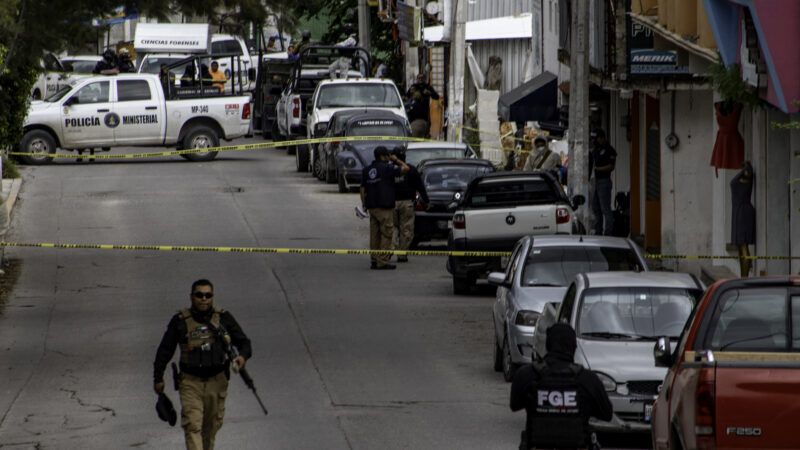Trump Goes After Mexico by Designating Drug Cartels Terrorist Organizations
Designating cartels as terrorist organizations could allow the feds to prosecute people who pay protection money—and might pave the way for undeclared war.

The new Trump administration is "designating the cartels as foreign terrorist organizations" as part of a crackdown on drug trafficking across the U.S.-Mexican border, President Donald Trump said during his inauguration speech on Monday.
Trump also promised "to use the full and immense power of federal and state law enforcement to eliminate the presence of all foreign gang criminal networks" through the Alien Enemies Act of 1798, which allows the government to round up foreigners who are citizens of a country that Congress has declared war on or that is engaged in an "invasion or predatory incursion."
The terrorism designations are not exactly a declaration of war. A Foreign Terrorist Organization (FTO) designation bans Americans—or anyone who wants to immigrate to the United States—from providing any kind of "material support" to a designated terrorist group and allows victims of terrorism to sue alleged FTO supporters for compensation. Meanwhile, a Specially Designated Global Terrorist (SDGT) designation allows the U.S. Treasury to seize a group's assets.
Trump's executive order will apply both FTO and SDGT designations and will include non-Mexican gangs as well, such as El Salvador's MS-13 and Venezuela's Tren de Aragua, according to Fox News.
Unlike other U.S. sanctions, the FTO and SDGT lists don't include exemptions for free speech or humanitarian aid. While Americans are allowed to buy books from Cuba or ship food to North Korea despite the U.S. embargoes on those countries, the same doesn't apply to Al Qaeda.
SDGT sanctions have been a headache for international charities working in Yemen under Houthi rule and Afghanistan under Taliban rule, and contributed to a near famine in the latter country. Adding drug cartels to the FTO list could have similarly far-reaching consequences, both for Americans doing business south of the border and Mexicans trying to immigrate north.
"Because the cartels are so closely intertwined with legitimate businesses (in mafioso-like protection rackets), many people are forced to pay them off or be killed. Under US law, that could count as material support to terrorism," writes attorney Aaron Reichlin-Melnick, a senior fellow at the nonprofit American Immigration Council.
Ironically, immigration hawks worry that a terrorist designation might make it easier for Mexicans to come to the United States as refugees, since they can claim they are fleeing terrorism. "If you designate them as terrorists, you've just created millions of more legal asylum seekers," Rep. Dan Crenshaw (R–Texas) told Fox News in 2023. "Now, look, are they obviously terrorists? Of course. They act like terrorists. But if you designate them that way, you make our immigration crisis much worse."
Even though terrorism designations are not legally a declaration of war, they might make it politically easier to send U.S. troops to Mexico—which Trump's advisers have said he wants to do—without asking Congress.
In 2020, congressional Republicans failed to pass a blanket authorization for military force against any designated FTO. "The FTO list has never been a war authorization," Sen. Tim Kaine (D–Va.) pointed out at the time. "It's created by the administration. It adds the names to it."
That hasn't stopped the White House from acting as if FTO listings were war authorizations. The first Trump administration designated a branch of the Iranian military as a terrorist organization, then assassinated its head, Gen. Qassem Soleimani, nearly sparking war with Iran. In its justifications to the public, the administration kept citing its own FTO designation order.
Trump's national security adviser, former Rep. Mike Waltz (R–Fla.), introduced a bill in 2023 to authorize war against Mexican cartels—and any other drug trafficker or criminal organization the president chooses. It didn't go anywhere. Still, some lawyers believe that the Trump administration could attack cartels without asking Congress, using the Biden administration's own (dubious) legal standard for military force short of "war."
"Under international law, a government has a duty to ensure that lawless groups don't use its territory to carry out predations against its neighbors. If a government is unwilling or unable to do so, then the country being harmed has the right to take direct action to eliminate the threat, with or without the host country's approval," Trump's former attorney general Bill Barr wrote in 2023, citing the precedent of U.S. troops in Syria.
Mexico wouldn't be the first country where the U.S. government has tried to mix the war on terror with the war on drugs.
The Clinton administration sent military aid to Colombia and launched covert operations in a campaign against both communist rebels and drug traffickers, invoking the theory of "narco-terrorism," that illegal drug profits are the root cause of violent insurgency. The first Trump administration tried a similar strategy in Afghanistan, bombing alleged drug labs in hopes of starving the Taliban of revenue.
A Colombian government report from 2022 found that the war on drugs only prolonged and worsened Colombia's civil war. Besides, both sides had the fingers in the pot. The infamous drug kingpin Pablo Escobar built up his power by playing to both communist and anticommunist forces, after all. A similar story played out in Afghanistan, where the Taliban and the U.S.-backed republic alike made money from the drug economy.
Washington has also been involved with Mexico's own war on drugs already. The United States sent Mexico over $3 billion in security aid from 2008 to 2023. A big question is whether the Mexican government will take Trump's terrorism sanctions as a supplement to existing policy—or a new form of hostile pressure.
"We will work together, but we will not be subordinate," Mexican President Claudia Sheinbaum said last month. "Mexico is a free, sovereign, independent country. And we do not accept interference in our country."


Show Comments (49)